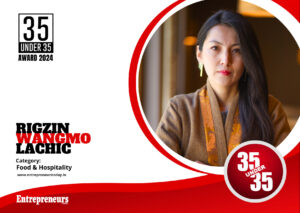
Rigzin Lachic, a Ladakhi entrepreneur, founded Dolkhar, a sustainable boutique stay in Leh inspired by the region’s people, culture, and environment. Dolkhar integrates traditional values with luxury, balancing comfort with discovery.
Her vegetarian restaurant, Tsas, uses produce from Dolkhar’s garden and local sustainable producers, re-imagining modern Ladakhi cuisine. Tsas was listed among Conde Nast’s 9 most innovative Indian restaurants in 2022. Dolkhar earned spots on Conde Nast Traveller’s Global Hotlist 2023, TIME’s World’s Greatest Places, and Silicon India Magazine’s top ten sustainable tourism startups. Rigzin won the Forward Thinker in Travel award at the IWTA 2023 Awards.
“I named the resort ‘Dolkhar’ after my grandmother, aiming to honor her vision of nurturing the land,” says Rigzin.
Returning to Ladakh in 2017, she saw the need to reimagine tourism. Dolkhar showcases local architecture, traditional crafts, and lost ingredients. Rigzin reveals,
“This project transcended business, becoming a way to reconnect with my roots and promote responsible tourism. To further Dolkhar’s cause, I co-founded Hatti, a social enterprise working with local artisans to highlight Ladakh’s crafts. Through Dolkhar and Hatti, I hope to share Ladakh’s essence with visitors while protecting our cultural and environmental heritage for future generations.”
Unlike Others
Dolkhar’s uniqueness lies in its profound reverence for Ladakh’s people, culture, and indigenous practices. This local-centric approach embodies true sustainability. Dolkhar consists of just seven villas, allowing for personalized guest attention and a sense of belonging.
These villas are meticulously crafted using locally sourced materials and age-old construction techniques, including compressed stabilized earth blocks, willow and poplar wood roofs, and traditional columns and beams.
Over forty Ladakhi craftspeople from diverse villages contributed to the authentic interiors, ensuring Dolkhar reflects the soul of Ladakh while upholding community and sustainability values.
Interviewer: What do you believe makes Dolkar special?
Rigzin: “What I believe is special is that Dolkhar’s architectural fabric is woven with locally sourced materials, and shaped by skilled indigenous artisans employing age-old construction techniques. These include compressed stabilised earth blocks (CSEB), roofs handcrafted from local willow and poplar wood, and traditional columns and beams for structural integrity. Collaboration with over forty Ladakhi craftspeople hailing from diverse villages enriches the interiors with an authentic local touch.”
Rigzin also mentions that, unlike conventional lodgings, Dolkhar’s passive solar design in its CSEB structures provides year-round operational advantages.
Guests can enjoy Ladakh’s seasons, from the vibrant summer hues of lakes and rivers to the ethereal blossoms of spring, the autumnal cascade of poplar leaves, and captivating winter wildlife encounters.
Dolkhar curates unique experiences that immerse travelers in lesser-explored facets of the region, supporting local economies and communities often overlooked by mainstream tourism, promoting responsible and sustainable development.
Navigating Challenges
Rigzin faced numerous challenges while building Dolkhar in Ladakh. Reconnecting with the local community after spending most of her life away was a personal and professional endeavor. As a young woman in a male-dominated construction sector, she had to work hard to be taken seriously.
The geographical realities of Ladakh, with a construction season limited to six months due to harsh winters, extended the project timeline to four and a half years. Securing financing through state initiatives was difficult, requiring multiple trips and dealing with complex paperwork.
The saturated hospitality market in Ladakh made it challenging to portray the region as a high-value destination with rich cultural dimensions. She shares,
“Portraying Ladakh as a high-value destination, while highlighting its many cultural dimensions, has been challenging. We are critically aware of our impact on natural resources and have implemented various solutions, from using natural building materials and creating a zero-waste ecosystem in our kitchen to employing passive solar heating methods. However, we continually strive to innovate and reduce our carbon footprint, aiming to reach zero.”
Additionally, she faced difficulties in empowering local artisans and presenting their crafts as valuable art. Implementing sustainable practices and reducing the carbon footprint at Dolkhar while promoting responsible tourism also posed significant challenges.
Celebrating Feats
Rigzin and Dolkhar have achieved notable success and recognition. Dolkhar was featured on Conde Nast Traveller’s “Global Hotlist 2023” and TIME magazine’s “World’s Greatest Places,” and it was included in Silicon India Magazine’s list of the “ten best sustainable tourism startups.”
Her restaurant, Tsas, earned a spot among Conde Nast’s 9 Most Innovative Restaurants in India in 2022 and was nominated for the Zee Zest Unlimit Awards 2023 in the Best Regional Restaurants category.
Dolkhar and Tsas have also been highlighted in publications such as Platform Magazine, Homegrown Magazine, and STIR Magazine.
Personally, Rigzin was honored at the Inspiring Women in Travel – Asia (IWTA) 2023 Awards, winning the ‘Forward Thinker in Travel’ and ‘Women in Tourism – Asia’ awards. She also participated as a panellist in News18’s “Rising India SheShakti” initiative, celebrating women contributing to India’s growth.
Interviewer: What does success mean to you personally?
Rigzin: “At Dolkhar, we define our success by the meaningful impact we’ve made on Ladakh’s community, environment, and cultural heritage. We’ve focused on the needs and interests of local people, empowering artisans, farmers, and entrepreneurs with stable incomes and opportunities to showcase their skills.”
Plans Ahead
Looking ahead, Rigzin aims to drive a broader shift towards sustainability in the Himalayan travel industry. The focus will be on deepening sustainable practices, researching local traditions, and revitalizing disappearing cultural elements.
Dolkhar seeks to be a benchmark for ethical tourism, inspiring others to adopt a regenerative approach that benefits both people and the planet. The goal is to continue enriching guests’ experiences with conscientious hospitality while promoting respect for the local environment, communities, and culture.
Major Takeaways
Rigzin’s journey has taught her several important lessons. She emphasizes the responsibility of understanding how every decision impacts the environment, economy, and community, highlighting that each action contributes to the broader goal of sustainability. As per her, embracing and taking pride in local culture and traditions, and authentically sharing these with a global audience, is crucial.
She also stresses that sustainability should be a core value, not just a marketing tool, and that true change comes from genuine, actionable efforts. For the aspiring entrepreneurs, she advices,
“Recognise the responsibility of your role. Understand that every small action has broader implications. Embrace and integrate your culture authentically, and let your commitment to sustainability be evident in your actions, not just your messaging.”







